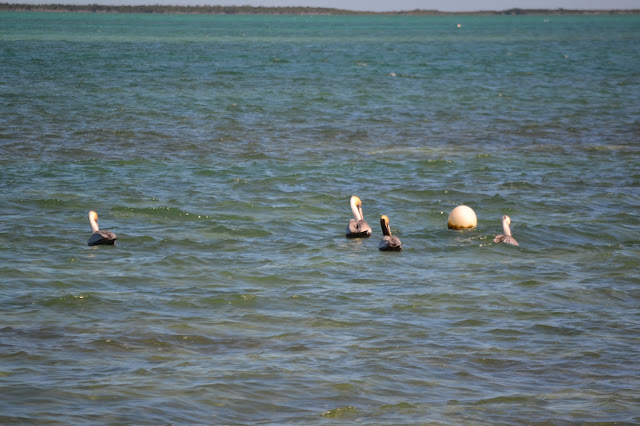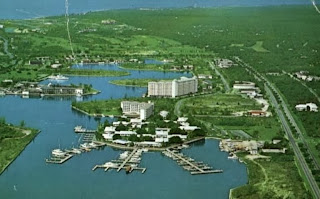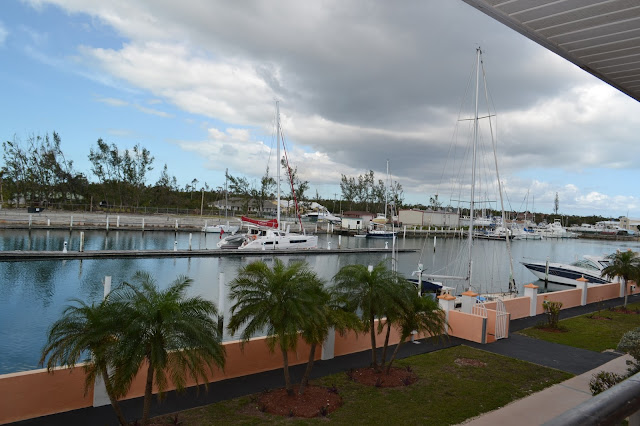Minister Darville on Hawksbill Creek Agreement to the House
Nassau, Bahamas - The Hon. Minister Dr. Michael Darville, Member of Parliament for Pineridge and Minister For Grand Bahama House of Assembly Contribution- A Bill for An Act to Extend for a Period of Three Months Certain Tax Exemptions Granted under the Agreement known as The Hawksbill Creek Agreement 17th February, 2016:
Mr. Speaker, it is with great pride that I stand, as Minister for Grand Bahama, on behalf of the people of Grand Bahama and the residents of Pineridge, to support this bill which seeks to extend for a period of three months, certain tax exemptions granted under the Hawksbill Creek Agreement; and would give the cabinet subcommittee and the Hawksbill Creek Agreement Review Committee, the additional time needed to finalize the negotiations with the Grand Bahama Port Authority, and the relevant stake holders.
Mr. Speaker, what sits as a key point of interest among many must be the Government’s position with respect to the expiring concessions under the Hawksbill Creek Agreement.
Mr. Speaker, you may recall, in March of 2015, The Rt. Hon. Member for Centerville appointed the Hawksbill Creek Agreement Review Committee, who were mandated to formulate and present recommendations to the Cabinet. The terms of reference for the committee were firstly, to achieve consensus with the Grand Bahama Port Authority and licensees on a long term economic strategy for the development of Grand Bahama Island;
Secondly, to create the framework for long term investment promotion on the island of Grand Bahama, in order to attract quality investors that would operate competitively and at world class standards;
Thirdly, to create a regulatory framework that is in keeping with present and changing international best practices;
And lastly, to implement a tax regime that ensures the continued maintenance of aspects of Freeport’s infrastructure, and enhancement of the government’s revenue base.
Mr. Speaker, some people, including members on the side opposite, have questioned why this administration is seeking additional time to negotiate the terms of this agreement, since we were fully aware that the expiration date was fast approaching. Others feel that we should have had a clear decision readily available prior to the agreement’s expiration date, as to the way forward for Grand Bahama.
Mr. Speaker, as I have stated in this Honourable House on previous occasions, much has changed in Grand Bahama since 1993, when the former administration extended those same provisions of the Hawksbill Creek Agreement for an additional twenty two (22) years, for an estimated cash consideration in the range of twenty five to thirty five ($25 - $35) million dollars. That arrangement may have been sufficient in those times, given the hope by the former administration that such a generous act at the expense of the public purse would have provided an incentive for the Grand Bahama Port Authority to attract additional investments that would expand the economy of the island.
Nevertheless, Mr. Speaker, this did not happen, because there were no measures put in place by the government of that day, to monitor the commitments of that Agreement for compliance, and today, whether or not these commitments have all been satisfactorily fulfilled, remains questionable.
Mr. Speaker, the imminent expiration of these concessions provided an opportunity for the Government to secure a comprehensive set of new arrangements, which when executed accurately, rather than hastily, will spur further economic development, and increase Grand Bahama Island’s contribution to the public purse.
Mr. Speaker, there is still more input that is required in order to provide the Cabinet with the information it needs to effectively and intelligently, and not impulsively, take action in these matters.
I am of the firm belief, Mr. Speaker, that within this three month extension period, which is being sought, this administration is taking the appropriate steps to ensure that we will not make the same mistakes that the former administration did in 1993, as we seek to chart a more equitable path for the Bahamian people moving forward, which will positively impact the present and future economic growth of Grand Bahama’s economy.
Mr. Speaker, I have always been optimistic about the future of Grand Bahama and I’ve been criticized over the past four (4) years for being unrealistic as I continually spoke life and prosperity over the lives of the people of Grand Bahama, whom I am privileged to serve.
But Mr. Speaker, during intense discussions over the last few months concerning the affairs of Grand Bahama, the cabinet subcommittee, led by the Honourable Member for Centerville, travelled to London and Europe to address issues of investments that would affect the future growth and development of Freeport and by extension the entire island of Grand Bahama.
Mr. Speaker, I am pleased to report to this Honourable house and the people of Grand Bahama that under the leadership of the Right Honourable Member for Centerville, we believe we have found a formula through direct foreign investment that would change the economic future for Grand Bahama now and for future generations to come.
Mr. Speaker, the Honourable Member for Centerville, in moving the bill, clearly articulated the government's position and gave a glimpse of what is to come. We are still in the negotiation process with investors and stakeholders. But moving forward things will began to move very fast and this three month extension is necessary to assist us to complete this complex piece of work.
Mr. Speaker, this administration believes that there is no way to fix our country, without fixing the island of Grand Bahama first. The government is fully aware of the urgency of this matter, and will make its determination on the way forward during this three (3) month window period, which I would like to point out, is less time than the former FNM government took in 1993.
Mr. Speaker, Despite a difficult economic climate the economy of Grand Bahama is progressing steadily. Many businesses including Bahama Rock, which has commenced a $ 9.3 million dollar phased expansion project, and other small businesses, such as Caribbean Bottling, Bahamian Brewery and Island Bedding, have underwent upgrades.
Mr. Speaker, Pharmachem, a major manufacturing company on Grand Bahama, is scheduled to break ground next month for its new plant; and yes, Mr. Speaker, the multimillion dollar expansion of Deep Water Cay Resort in East Grand Bahama is underway.
Additionally, Mr. Speaker, this administration is completing much needed infrastructural works such as the storage facility at the C.A. Smith Complex, and the state of the art fire station, which are both on schedule and within budget.
Mr. Speaker, you will recall the ground breaking ceremony which took place in December, 2015 for the six million ($6,000,000.00) dollar Bridge/Causeway, which will replace the Fishing Hole Road, which is being undertaken through a public-private partnership with local stakeholders and The Government of The Bahamas.
Furthermore, Mr. Speaker, upgrades for the Rand Memorial Hospital and the West End Clinic are on the horizon; and there have been successful strides in the growth and development of medical tourism on the island.
Mr. Speaker, this administration has recently approved several projects which will have a significant impact on the local economy of Grand Bahama. These projects include the two hundred and eighty million dollar ($280,000,000.00), Phase five investment in the Container Port expansion by Mediterranean Shipping Company, MSC, in partnership with Hutchinson Ports, which will facilitate a 40% increase in capacity and output to two million (2,000,000) containers per annum; and will have a significant impact on production and employment at the Freeport Container Port.
Additionally, Mr. Speaker, the Mediterranean Shipping Company has announced the opening of a maritime academy in Freeport, which will train and recruit hundreds of Bahamians over a two (2) year period for crewing on MSC vessels.
Mr. Speaker, MSC is also working with the College of The Bahamas Northern Campus, the ministry of education and the ministry of transport and aviation to create an educational module tailored specifically for the maritime industry that would incorporate training with some of our brighter students throughout the country.
Mr. Speaker, as it relates to the tourism sector, the overall performance in Freeport was positive in 2015. You will note Mr. Speaker, the increase in airlift by Sunwing’s operations in Canada and in the USA, and from new gateways in Cincinnati, Newark, Dallas and Baltimore. Memories Resort in particular, Mr. Speaker, which is operated by Sunwing, achieved record levels of occupancy last year, which contributed to Grand Bahama, as a whole, experiencing a 30% increase in international arrivals.
Mr. Speaker, even against that backdrop, Grand Bahama is still not performing to the level of other islands in the commonwealth, which have less infrastructure and human capital; and it is widely recognized that a more considerable amount of investment must be sought and incentivized in order to increase the level of the economic activity in Freeport, and by extension, Grand Bahama.
Mr. Speaker, we still have many challenges and there is much more that must be done to move the economy of Grand Bahama to a level of sustainability, which will significantly impact employment, livelihoods, and by extension, the long-term economic well-being of the island.
Nevertheless, Mr. Speaker, this administration remains committed with a new plan for the restoration of the island of Grand Bahama and the diversification and revitalization of our local economy; and we are making significant progress toward realizing this objective through this negotiation process.
Mr. Speaker, there is still the ongoing debate on Grand Bahama regarding the Hawksbill Creek Agreement, and its effects on the economic growth and development on the island over the last ten (10) years. Many residents and licensees of the Grand Bahama Port Authority are concerned about the relevance of this Agreement, which was signed in 1955, and affirm its need to be reviewed for the benefit of the owners, the government, and the licensees of the Grand Bahama Port Authority, as well as the residents of Grand Bahama. Others believe that this same agreement, which transformed Freeport from a pine forest to a city with awesome infrastructure, is now responsible for its economic stagnation.
Mr. Speaker, in our Charter of Governance, we indicated to the Bahamian people that we would address these complicated issues and create a new paradigm shift for Freeport where the Bahamian people will finally have equity, new investors would be brought to the table; and together with our partners, we would transform the current economic model into one that would promote direct foreign investment, create jobs and opportunities for Bahamians.
For this reason, it is very important for this administration to have this additional three (3) months, which will allow for proper developmental strategies to be devised, that can assist the government, the Grand Bahama Port Authority and all the relevant stakeholders to move forward in a manner that is beneficial, and aligned with current global standards and best business practices.
Mr. Speaker, Grand Bahama is our country’s second most populated island and Freeport is the nation’s second city. Both have the capacity to grow in scope of activity and in the relative importance to overall GDP. While the population of the island has declined slightly over the years, we know that the city of Freeport alone has the capacity, with the existing infrastructure, to accommodate in excess of two hundred and fifty thousand (250,000) people.
Mr. Speaker, Grand Bahama has the infrastructure, the land mass and through proper planning, and investments in industry, agriculture, medical tourism and boutique resorts projects for East and West Grand Bahama , we will once again have a robust economy.
Mr. Speaker, the city of Freeport in particular is unique, in that it is the only city in our archipelagic nation that has a Free Trade Zone. When the Hawksbill Creek Agreement was signed in 1955, the government of the day became an early adopter of an economic and trade facilitation system which is now very common throughout the world.
Mr. Speaker, free trade zones, have as their sole purpose the promotion of the overall economic growth and diversification of the economic base of the countries they are based in. These free trade zones are usually enhanced by streamlined business licensing and regulatory processes and other preferential arrangements, to ensure that conducting business is fast and easy.
Mr. Speaker, we are indeed part of a global village; and as such, our free trade zone must remain competitive. Hence, this administration is making strides, as promised in our Charter for Governance, to create a true ‘One Stop Shop’ through the Ministry for Grand Bahama, that will facilitate the smooth flow of business for existing and/or new developers, as well as those interested in the construction of first class, regional, logistics and distribution centres, warehousing and storage facilities within the free trade zone.
Mr. Speaker, we are currently reviewing how we must use Freeport for the greater goal of national economic development and prosperity. The tax exemptions, which will be considered for renewal over the next three months, are a small part of this administration’s analysis of the way forward for Grand Bahama Island. In the long term, the future planning of the City of Freeport must be in consistent with the country's overall national development plan.
Mr. Speaker, this discussion, as well as the overall context of how the city of Freeport will contribute to the National Development, will be finalized over the next three months.
Mr. Speaker, the Hawksbill Creek Agreement Review Committee, led by Chairman Dr. Marcus Bethel, has brought forward a comprehensive report that outlined the views both in support of and in opposition to the extension of this agreement.
Nevertheless, Mr. Speaker, a further detailed analysis and dialogue with the Grand Bahama Port Authority and Hutchinson Whampoa Limited will take place, which will take into account all the parameters of the Hawksbill Creek Agreement, for the purpose of immediate and long term planning.
Mr. Speaker, this three month extension will give the negotiators additional time to take each scenario into consideration, and finalize the way forward with all stakeholders and new investors. This Mr. Speaker, cannot happen by utilizing the same methods that created the problems we now face. Following final negotiations with new investors and local stakeholders, comprehensive recommendations would be made to the cabinet, and at the conclusion of these critical negotiations with the Grand Bahama Port Authority, Hutchinson Whampoa Limited, the licensees and the residents of Grand Bahama; a decision will be articulated.
Mr. Speaker, the people of Grand Bahama can rest assure that this administration will be on the right side of history and will find the right formula to revive and sustain the economic growth and development, not only for the city of Freeport, but the Grand Bahama Island in general; and that will provide opportunities for our people.
Mr. Speaker, as I close, I would like to thank the members of The Hawksbill Creek Review committee and the Member for Centerville, for his visionary foresight in tackling Grand Bahama’s economic challenges, and for working closely with my Ministry and the relevant stakeholders on the island of Grand Bahama to create a paradigm shift that would positively transform the economic landscape of the island of Grand Bahama for generations to come.
With these few words, Pineridge seconds this bill.




Comments
Post a Comment